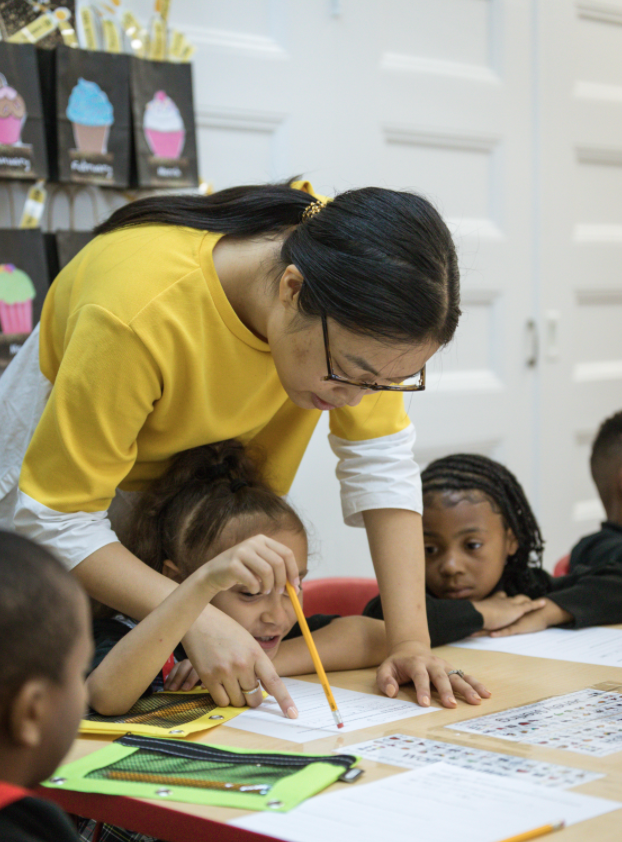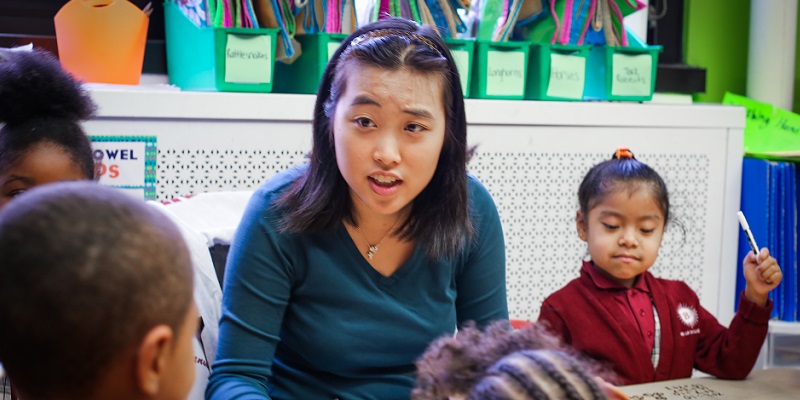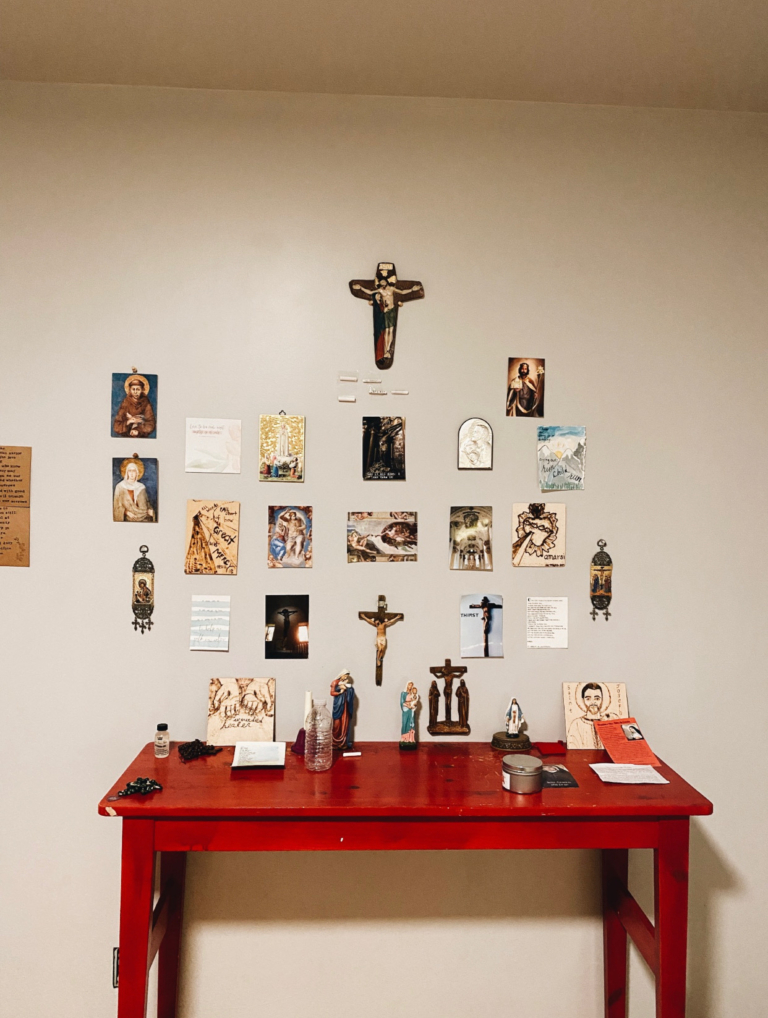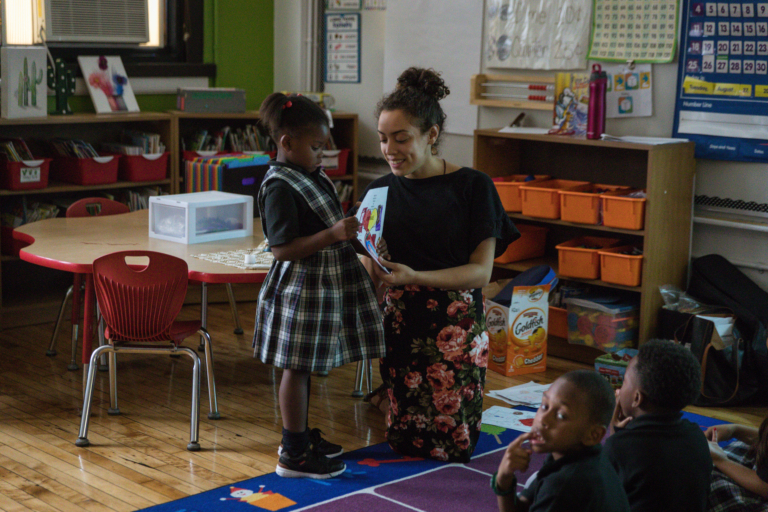Emilia Chornay began her career in education when she served as a Seton Teaching Fellow with our 4th Cohort, during the 2017-2018 school year. Emilia, who left her undergrad with a degree in chemical engineering, fell in love with the gift of education and the call to Christian service. She stayed on as an elementary teacher for two years, before transitioning to her current role as national manager of community and formation for our Seton Teaching Fellows. In this excerpt from a speech, Emilia reflects on the gifts of error and free will in the classroom. She shares how we can turn mistakes into an authentic opportunity for virtue—one that truly respects the freedom of choice which every soul carries.
After finishing my time as a classroom teacher, I had to make a choice as to what path I would pursue. In the end, I continued my journey with Seton Teaching Fellows because I was called to a level of holiness I had never experienced before. I could lose myself in obedience to God’s will, and it was the most freeing experience ever. I could completely lose myself to love others, and in doing so, lose nothing. By losing ourselves to Christ, we gain everything. That’s the beauty of free will. That’s the beauty of being able to choose God. If that Christ-like abandonment was mandated, made without error—a compulsory act determined for us—it would lose its inherent dignity.

Fundamentally, every person carries the gift of free will. It’s a splendid consequence of our being made in the image and likeness of God. This freedom provides an inroad for virtue, but it most certainly provides room for mistakes and error as well. As it is with every facet of life, the freedom to make mistakes is present in the classroom, and it’s something educators need to more consciously address. True Christian authority, the kind of authority our Baptism calls us to practice in the classroom, is authentic; and authentic authority asks us to normalize error and the choice to do good.
Showing that error is part of the human experience, and allowing a space for virtuous correction of that error, is absolutely one of my favorite practices of teaching. This means letting error become redemptive. It’s a necessary part of your classroom’s deeper, more human learning. When you show students they have the freedom to err, the weaknesses and imperfections of you (yes, you the teacher) and your students become part of the Cross. Simply put, when you and your students make mistakes in the classroom, it is an opportunity for authenticity. If you are a servant of Christ, you strive to die to yourself. You aren’t trying to be perfect, you are just trying to let Christ lead you. When your ego is dead, what arises is your authentic self. That self is one that your students can truly identify with and build a relationship with, and it’s also one they can learn from.
A Christian response to error helps children grow in their authenticity, finding their security not in their own ego, but in the gift of themselves.
Authenticity means owning your mistakes. Do this in front of your students. Name your mistakes. Rectify each one towards your and your students’ growth. This is reciprocal for your students. By witnessing your mistakes, and seeing that you still have value, they believe the same. A Christian response to error helps children grow in their authenticity, finding their security not in their own ego, but in the gift of themselves.
To highlight an example of this, I used to teach a math curriculum called Math Stories. In it, we would have a word problem of the day and learn to both represent the word problem and subsequently calculate the solution. There was a lesson I used that compared a student’s incorrect representation and a correct one. I would approach the student with the wrong representation and show them in a gentle way that their work didn’t match the word problem. I would then ask their permission to use their example for the class’s benefit. I would share all of the students’ work, and would ask everyone in the group to identify which representation matched the story. I would then ask how we could fix the one that didn’t match. After our discourse, the student who made a mistake would come up in front of the whole group, fix it, and finish solving the problem, thus redeeming their mistake (and in doing so, they helped the other students learn).
This was really an incredible moment for students to use a host of higher order thinking skills, like analyzing, comparing, extending, creating; but—perhaps more importantly—it was a chance for them to practice the virtues of generosity, courage, and kindness. This was a beautiful lesson to learn, because not only did it require a mistake to be made, but the students had to freely offer up their mistakes as an opportunity for the class.
The reality is that true authority is authentic, and children recognize when it isn’t. It is absolutely necessary to show the reality of human weakness to our students. They need to see the proper response to sin.
Now besides instructional mistakes, there are often relational mistakes that manifest in the classroom. One which all teachers are likely guilty of at some point in their careers is unjust anger and a lack of patience. I remember one particular experience where I lost my temper and inappropriately yelled at my students. After being firmly corrected (justly so) by my supervisor, I went to apologize to my students. It was the only option if I was going to model a Christian response to error.
I told my class that I was sorry and shared that I was going to make better choices. I showed a desire for change and growth, rather than an apology that merely arose out of disciplinary measures. No one made me seek forgiveness, I freely chose it, and that made it meaningful. Oftentimes, the students we serve do not see adults who model the gifts of atonement and forgiveness. We hope to save face, feeling that admission of fault would undermine authority. This always backfires. The reality is that true authority is authentic, and children recognize when it isn’t. It is absolutely necessary to show the reality of human weakness to our students. They need to see the proper response to sin. Children have to learn that we can be better and that we are more than our mistakes, but that we also have to admit that we are flawed to start the process of redemption and learning. If you serve as a teacher, you have to let your ego die. In doing so, you can be authentic in the way you handle errors and mistakes in your classroom.
In reality, our mistakes are where we learn. It’s part of who we are, and it’s part of God’s magnificent plan for us. He’ll work with us, no matter the mistakes, as long as we choose to invite him into the moment. There is something mysterious about leaning into mistakes in order that we may perfect them—it’s intrinsically tied into the mystery of our salvation.
Interested in helping students cultivate virtue and the gift of faith? Consider being a Seton Teaching Fellow—missionaries, catechists, and evangelists bringing the light of Christ to urban education. We have immediate openings for the 2022-2023 school year. Applications for the 2023-2024 school year go live on September 5th 2022: Mother Teresa’s feast day. Join up with STF and find your Calcutta!



